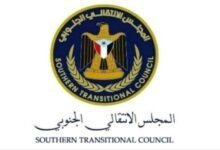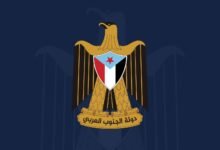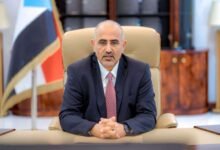Al-Khobaji discusses with United Nations offices coordinating relief efforts in Aden the capital

SMA NEWS – Aden the Capital
Dr. Nasser Al-Khobaji, Acting President of the Southern Transitional Council, Head of the Negotiations Affairs Unit, on Tuesday, at the Council’s headquarter in the capital Aden, a number of representatives of the United Nations offices operating in Aden.
At the meeting, Dr. Al-Khobaji welcomed the representative of the UN organizations operating in Aden, thanking them for their efforts and humanitarian role, stressing the support of the Southern Transitional Council to open offices for international humanitarian organizations in Aden as the capital of the country, and that this visit to the headquarter of the Council is an evidence of the depth of bilateral relations between the Southern Transitional Council and between the United Nations offices.
Al-Khobaji stressed the need to strengthen relations and cooperation between the Southern Transitional Council and international organizations, especially in confronting diseases and epidemics, foremost of which is the Corona pandemic, through health intervention programs to ensure that the health system in the capital, aden, and the surrounding areas does not collapse.
Al-Khobaji briefed the attendees on what has been implemented from the provisions of the Riyadh Agreement on the political side, such as forming the government, and the obstacles put in place to complete the implementation of the provisions of the economic and military sides, reconfiguring the oversight bodies, reconfiguring the Supreme Judicial Council, opening courts and looking into citizens’ grievances.
Dr. Al-Khobaji reaffirmed that the Southern Transitional Council and its political leadership are keen on the success of the efforts of the Arab coalition leadership to implement the Riyadh Agreement to enhance the chances of peace, and actively participate in the final solution consultations sponsored by the United Nations.
Al-Khobaji stressed the need to accelerate the implementation of the Riyadh Agreement in order not to result in another political crisis that doubles the suffering of the people of the south and worsens public services, calling on the parity government to assume its responsibilities towards the citizens before the protests escalate.
Al-Khobaji pointed out that the grave violations committed by the Brotherhood militia present in Hadramout valley against the peaceful demonstrators demanding better services and provision of salaries are among the reasons for the non-implementation of the military part of the Riyadh Agreement, including the departure of the military forces from Hadramout valley.
For his part, Eng. Adnan Al-Kaf, the member of the Presidency and Chairman of the Relief and Humanitarian Affairs Committee in the Council, explained the community awareness plan approved by the Relief Committee, stressing that the committee will participate with international organizations in implementing the plan of rehabilitation and training programs for all medical staff in the capital Aden and the neighboring governorates, in addition to the relief and development projects.
Eng. Nizar Haitham, the member of the Presidency and Head of the Executive Authority of the Council’s Local Leadership in Aden the capital, spoke about the worsening humanitarian crisis in the capital Aden due to the influx of displaced people and immigrants.
Haitham also called on representatives of international organizations to work on combating financial and relief corruption and to review plans for distributing humanitarian aids through some local partners, which are controlled by some parties, which harms the humanitarian role played by the United Nations agencies and other international organizations.
For their part, representatives of international organizations thanked the leaders of the Southern Transitional Council, for their update on the developments in Aden the capital, and the southern governorates, and their continued cooperation and the Transitional Council’s keenness to provide facilities for humanitarian aid to reach the people who deserve it.
They also talked about the humanitarian response plan for 2021, and the plan to confront the Corona pandemic, reviewing some of the difficulties they face while providing humanitarian aids, including delays in some government measures to allow entry and distribution of food aids, pointing to the decrease in donor funding for the humanitarian plan that was drawn up for this year, which caused delays in the implementation of some humanitarian relief programs.
The meeting was attended by Abdul Rahman Sheikh, member of the Presidency, member of the negotiating delegation, and Eng. Mohammad Al-Abadi, Advisor to the President of the Council for Organizations Affairs, and Raafat Abdul Hamid, member of the General Administration of Foreign Affairs.
On the part of the organizations, the attendees were: Sonia Al-Massad, representing the United Nations Office for the Coordination of Humanitarian Affairs (OCHA), Arwa Shaker, representing the United Nations Population Office (UNFPA), Mohan Mishra, representing the International Organization for Migration (IOM), and Jeffrey Odankra, representing the United Nations Development Program (UNDP), and Bakri Othman, for the World Food Program (WFP).







